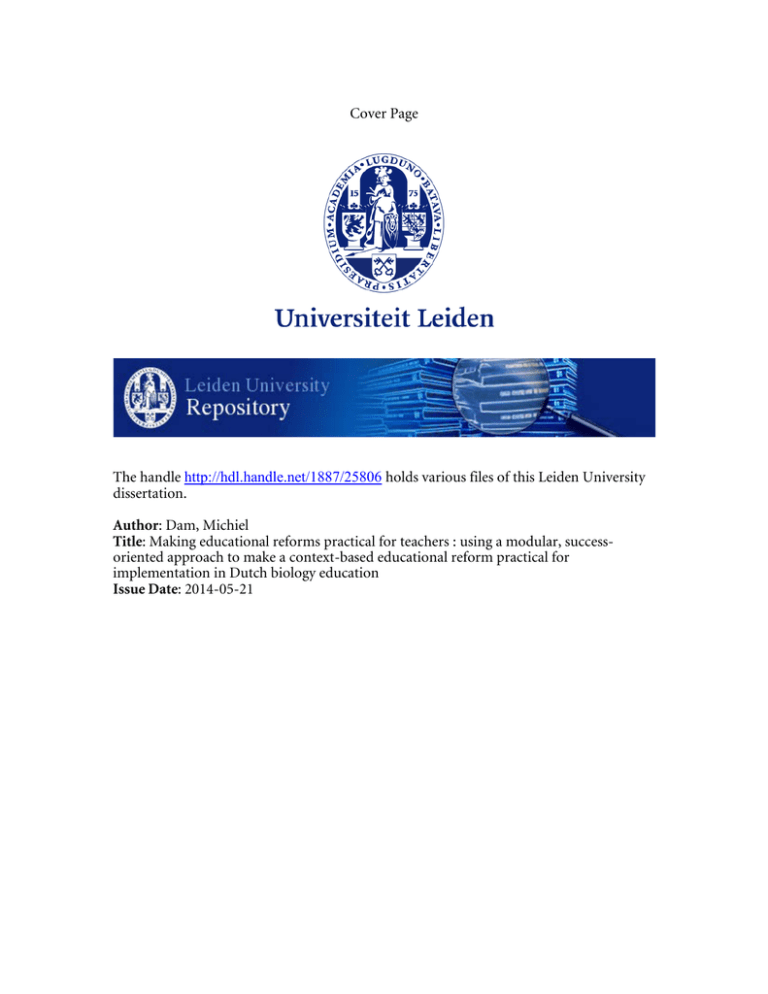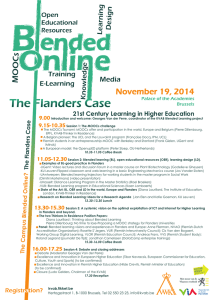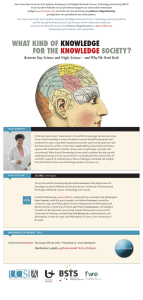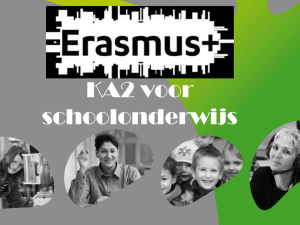References
advertisement

Cover Page The handle http://hdl.handle.net/1887/25806 holds various files of this Leiden University dissertation. Author: Dam, Michiel Title: Making educational reforms practical for teachers : using a modular, successoriented approach to make a context-based educational reform practical for implementation in Dutch biology education Issue Date: 2014-05-21 References Aikenhead, G. (2007). Humanistic perspectives in the science curriculum. In S. K. Abell & N. G. Lederman (Eds.), Handbook of research on science education (pp. 881–910). Mahwah, NJ: Lawrence Erlbaum. Ajzen, I., & Fishbein, M. (2005). The influence of attitudes on behavior. In D. Albarracín, B. T. Johnson & M. P. Zanna (Eds.), The handbook of attitudes (pp. 173-221). Mahwah, NJ: Lawrence Erlbaum. Ajzen, I. (2006). TPB diagram. Retrieved September 8, 2013, from http://people.umass.edu/aizen/tpb.diag.html Anderson, C. W. (2007). Perspectives on science learning. In S. K. Abell & N. G. Lederman (Eds.), Research on science education (pp. 3-30). Mahwah, NJ: Lawrence Erlbaum. Baldwin, C. Y., & Clark, K. B. (2000). Design rules: The power of modularity (Vol. 1). MIT Press. Ball, D. L., & Cohen, D. K. (1999). Developing practice, developing practitioners: Toward a practice-based theory of professional education. In L. Darling-Hammond & G. Sykes (Eds.), Teaching as the learning profession (pp. 3–31). San Francisco, CA: Jossey-Bass. Ball, D., & Forzani, F. M. (2009). The work of teaching and the challenge for teacher education. Journal of Teacher Education, 60(5), 497-511. Bandura, A. (1977). Self-efficacy: Toward a unifying theory of behavioural change. Psychological Review, 84, 191-215. Bandura, A. (1997). Self-efficacy: The exercise of control. New York: Freeman. Behrens, A., Doyle, J. J., Stern, L., Chuck, R. S., & McDonnell, P. J. (2006). Dysfunctional Tear Syndrome: A Delphi Approach to Treatment Recommendations. Cornea, 25(8), 900-907. Bennett, J., & Lubben, F. (2006). Context-based chemistry: The salters approach. International Journal of Science Education, 28(9), 999-1015. Bennett, J., Grasel, C., Parchmann, I., & Waddington, D. (2005). Context-based and conventional approaches to teaching chemistry: Comparing teachers. International Journal of Science Education, 27(13), 1521–1547. Bennett, J., Lubben, F., & Hogarth, S. (2007). Bringing science to life: A synthesis of the research evidence on the effects of context-based and STS approaches to science teaching. Science Education, 91(3), 347-370. Boersma, K. T. (2011). Ontwerpen van op de concept-contextbenadering gebaseerd biologieonderwijs. Utrecht: NIBI. 131 Boersma, K. T., Kamp, M. J. A., van den Oever, L., & Schalk, H. H. (2010). Naar actueel, relevant en samenhangend biologieonderwijs. Utrecht: CVBO. Boersma, K. T., van Graft, M., Harteveld, A. L., de Hullu, E., Knecht-van Eekelen, A., Mazereeuw, M. et al. (2007). Leerlijn biologie van 4 tot 18 jaar. Uitwerking van de concept-contextbenadering tot doelstellingen voor het biologieonderwijs. Utrecht: CVBO. Borko, H. (2004). Professional Development and teacher learning: Mapping the terrain. Educational Researcher, 33(8), 3–15. Borko, H., & Putnam, R. (1996). Learning to teach. In D. C. Berliner & R. C. Calfee (Eds.), Handbook of educational psychology (pp. 673-708). New York: Macmillan. Borko, H., Elliott, R., & Uchiyama, K. (2002). Professional development: Key to Kentucky’s educational reform effort. Teaching and Teacher Education, 18, 969-987. Borko, H., Jacobs, J., & Koellner, K. (2010). Contemporary approaches to teacher professional development. In E. Bekaer, B. McGaw & P. Peterson (Eds.), International Encyclopedia of Education (3 ed., pp. 548- 555). Oxford: Elsevier Scientific Publishers. Boulton-Lewis, G. M., Smith, D. J. H., McCrindle, A. R., Burnett, P. C., & Campbell, K. J. (2001). Secondary teachers’ conceptions of teaching and learning. Learning and Instruction, 11(1), 35-51. Bransford, J., Derry, S., Berliner, D., & Hammerness, K. (2005). Theories of learning and their roles in teaching. In L. Darling-Hammond & J. Bransford (Eds.), Preparing teachers for a changing world (pp. 40-87). San Francisco, CA: Jossey-Bass. Breiter, A., & Light, D. (2006). Data for school improvement: Factors for designing effective information systems to support decision-making in schools. Educational Technology & Society, 9(3), 206-217. Bulte, A. M. W., Westbroek, H. B., de Jong, O., & Pilot, A. (2006). A research approach to designing chemistry education using authentic practices as contexts. International Journal of Science Education, 29(9), 1063-1086. Campagnolo, D., & Camuffo, A. (2010). The concept of modularity: a literature review. International Journal of Management Reviews, 12(3), 259-283. Cuban, L. (1990). Reforming again, again, and again. Educational Researcher, 19(3), 3-13. Dam, M., Janssen, F. J. J. M., & Van Driel, J. H. (2010, July). Lesson segments as a tool for designing lessons in line with context-based biology education. Paper presented at the ESERA summer school. Dam, M., Janssen, F. J. J. M., & Van Driel, J. H. (2013). Concept-context onderwijs leren ontwerpen en uitvoeren - een onderwijsvernieuwing praktisch bruikbaar maken voor docenten [Learning to design and enact context-based biology education – making an educational reform practical for teachers]. Pedagogische Studiën, 90(2), 63-77. 132 Darling-Hammond, L., & McLaughlin, M. W. (1995). Policies that support professional development in an era of reform. Phi Delta Kappan, 76(8), 597-604. Davis, E. A., & Krajcik J.S. (2005). Designing Educative Curriculum Materials to Promote Teacher Learning. Educational Researcher, 34(3), 3-14. De Shazer, S. (1985). Keys to solution in brief therapy. New York: Norton. Deming, W. E. (2000). The new economics, for industry, government, education (2nd ed.). Cambridge, MA: MIT Press. Desimone, L. M. (2009). Improving Impact Studies of Teachers’ Professional Development: Toward Better Conceptualizations and Measures. Educational Researcher, 38(3), 181-199. Dick, W., Carey, L., & Carey, J. O. (2011). The systematic design of instruction (7th ed.). Pearson. Dionne, C. E., Dunn, K. M., Croft, P. R., Alf L. Nachemson, A. L., Buchbinder, R., Walker, B. F., & Wyatt, M. et al. (2008). A consensus approach toward the standardization of back pain definitions for use in prevalence studies. Spine, 33(1), 95-103. Doyle, W. & Rosemartin, D. (2012). The Ecology of Curriculum Enactment: Frame and tasks narratives. Interpersonal Relationships in Education, 3, 137-147. Doyle, W. (2006). Ecological approaches to classroom management. In C. Evertson & C. Weinstein (Eds.), Handbook of classroom managment: Research, practice and contemporary issues (pp. 97-125). New York: Lawrence Erlbaum. Doyle, W., & Ponder, G. (1977). The ethic of practicality and teacher decision-making. Interchange, 8, 1-12. Duffy, M. (1995). Sensemaking in Classroom Conversations. In I. Maso, P. A. Atkinson, A. Delamont & J. C. Verhoeven (Eds.), Openness in research: The tension between self and other (pp. 119-132). Assen, the Netherlands: Van Gorcum. Fishbein, M., & Ajzen, I. (2010). Predicting and changing behavior: The reasoned action approach. New York: Psychology Press (Taylor & Francis). Fishman, B. J., Marx, R. W., Best, S., & Tal, R. T. (2003). Linking teacher and student learning to improve professional development in systemic reform. Teaching and Teacher Education, 19, 643–658. Fullan, M. (2007). The new meaning of educational change (4th ed.). New York: Teachers College Press. Gage, N. L. (2009). A Conception of teaching. Dordrecht, the Netherlands: Springer. Garet, M. S., Porter, A. C., Desimone, L., Birman, B. F., & Yoon, K. S. (2001). What makes PD effective? Results from a national sample of teachers. American Educational Research Journal, 38(4), 915-945. Gerlach, V., & Ely, D. (1980). Teaching and media: A systematic approach (2nd ed.). Englewood Cliffs, NJ: Prentice-Hall Incorporated. 133 Gilbert, J. (2006). On the nature of ‘context’ in chemical education. International Journal of Science Education, 28(9), 957-976. Glynn, S., & Koballa, T. R. (2005). The contextual teaching and learning instructional approach. In R. E. Yager (Ed.), Exemplary science: Best practices in professional development (pp. 75–84). Arlington, VA: National Science Teachers Association Press. Goedhart, M. (2004). Contexten en concepten: een nadere analyse [Contexts and concepts: A further analysis]. NVOX, 29, 186–190. Gollwitzer, P. M. (1999). Implementation intentions: Strong effects of simple plans. American Psychologist, 54(7), 493-503. Gordon, T. J. (2010). The Delphi method. In J. C. Glenn & T. J. Gordon (Eds.), Futures Research Methodology - Version 3.0.: Millenium project (DC, USA). Zie millennium-project.org/millennium/FRM-V3.html Gordon, T. J., & Hemer, O. (1964). Report on a long range forecasting study. RAND Corporation. Greeno, J. G., Resnick, L., & Collins, A. (1996). Cognition and learning. In D. C. Berliner & R. C. Calfee (Eds.), Handbook of educational psychology (pp. 15-46). New York: Macmillan. Grossman, P., & McDonald, M. (2008). Back to the future: Directions for research in teaching and teacher education. American Educational Research Journal, 45(1), 184-205. Grossman, P., Compton, C., Igra, D., Ronfeldt, M., Shanan , E., & Williamson , P. W. (2009). Teaching practice: a cross-professional perspective. Teachers College Record, 111(9), 2055-2100. Guskey, T., R. (2000). Evaluating professional development. Thousand Oaks: CA. Corwin Press. Gustafson, K., & Branch, R. M. (2002). Survey of instructional development models (4th ed.). Syracuse, New York: ERIC Clearinghouse on Information and Technology. Hammerness, K., Darling-Hammond, L., & Bransford, J. (2005). How teachers learn and develop. In L. Darling-Hammond & J. Bransford (Eds.), Preparing teachers for a changing world: What teachers should learn and be able to do (Vol. 1). San Francisco: Josey Bass. Hargreaves, A., & Fink, D. (2006). Sustainable leadership. San Francisco, CA: Jossey-Bass. Hatano, G., & Inagaki, K. (1986). Two courses of expertise. In H. Stevenson, J. Azuma & K. Hakuta (Eds.), Child development and education in Japan (pp. 262-272). New York: Freeman. Holland, J. H. (2000). Emergence: From chaos to order. Oxford: Oxford University Press. Ingram, D., Louis, K. S., & Schroeder, R. G. (2004). Accountability policies and teacher decision making: Barriers to the use of data to improve practice. Teachers College Record, 106(6), 1258-1287. Janssen, F. J. J. M., Westbroek, H. B., Doyle, W., & Van Driel, J. H. (2013b). How to make innovations practical. 134 Teachers College Record, 115(7). 1-43. Janssen, F. J. J. M., De Hullu, E., & Tigelaar, D. (2009). Using a domain-specific model to improve student teachers’ reflections on positive teaching experiences. Action in Teacher Education, 31(2), 86-98. Janssen, F. J. J. M., De Boer, E., Dam, M., Westbroek, H.B., & Wieringa, N. (2013a). Design research on developing teaching repertoires. In Plomp, & Nieveen (Eds.), Educational design research – Part B: Illustrative cases (pp. 757-780). Enschede, the Netherlands: SLO. Janssen, F. J. J. M., De Hullu, E., & Tigelaar, D. (2008). Positive experiences as input for reflection by student teachers. Teachers and Teaching, 14(2), 115 - 127. Jonassen, D. H. (1999). Designing constructivist learning environments. In C. M. Reigeluth (Ed.), Instructional-design theories and models; a new paradigm of instructional theory (Vol. 2, pp. 215-239). New York: Lawrence Erlbaum. Joyce, B., & Weil, M. (2008). Models of teaching (8th ed.). NJ: Pearson. Kamp, M. J. A. (2010). Ontwerpregels voor lesmateriaal voor biologie volgens de concept-contextbenadering (in de interpretatie van de CVBO). Kennedy, M. M. (2005). Inside teaching: how classroom life undermines reform. Harvard University Press. Kennedy, M. M. (2010). Attribution Error and the Quest for Teacher Quality. Educational Researcher, 39(8), 591-598. Klein, G., Moon, G., & Hofman, R. R. (2006). Making sense of sensemaking 2: A sacrocognitive model. Intelligent Systems, IEEE, 21(5), 88-92. KNAW. (2003). Biologieonderwijs: een vitaal belang [Biology education: A vital concern]. Amsterdam: Koninklijke Nederlandse Akademie van Wetenschappen. Kortland, J. (2007, August). Context-based science curricula: Exploring the didactical friction between context and science content. Paper presented at the seventh ESERA conference, Malmö, Sweden. Retrieved from http://www.phys.uu.nl/∼kortland/uk_publications.htm. Krajcik, J., McNeill, K. L., & Reiser, B. J. (2008). Learning-goals-driven design model: Developing curriculum materials that align with national standards and incorporate project-based pedagogy. Science Education, 92(1), 1–32. Krathwohl, D.R. (2002). A Revision of Bloom’s Taxonomy: An Overview. Theory Into Practice, 41(4), 212-218. Loucks-Horsley, S., Stiles, K.E., Mundry, S., Love, N., & Hewson, P.W. (2010). Designing professional development for teachers of science and mathematics (3rd ed). Thousand Oaks, CA: Sage. Mandinach, E. B. (2012). A perfect time for data use: Using data-driven decision making to inform practice. Educational Psychologist, 47(2), 71-85. Mandinach, E. B., & Honey, M. (2008). Data-driven school improvement: Linking data and learning. New York, NY: Teacher College Press. 135 Marzano, R. J. (2007). The art and science of teaching. A comprehensive framework for effective instruction. Alexandria: ASCD. Mayer, R. E. (2002). Rote versus meaningful learning. Theory into practice, 41(4), 226-232. McQuinn, P. (2012). Stimulating Reform. Race to the Top, Competitive Grants and the Obama Education Agenda. Educational Policy, 26(1), 136-159. Merrill, M.D. (1983). Component display theory. In C. M. Reigeluth (Ed.), Instructional Design Theories and Models (pp. 279-333). Hillsdale, NJ: Lawrence Erlbaum. Merrill, M. D. (2001). Components of Instruction. Toward a Theoretical Tool for Instructional Design. Instructional Science, 29, 291-310. Merrill, M. D., Barclay, M., & van Schaak, A. (2008). Prescriptive principles for instructional design. In J. M. Spector, M. D. Merrill, J. J. G. Van Merriënboer & M. F. Driscoll (Eds.), Handbook of research on educational communications and technology (3rd ed., pp. 173-184). New York: Lawrence Erlbaum. Miles, M., & Huberman, A. (1994). Qualitative data analysis: An expanded sourcebook. Thousand Oaks, CA: Sage. Miller, S., Hubble, M., & Duncan, B. (Eds.). (1996). Handbook of solution-focused brief therapy. San Francisco, CA: Josey-Bass. Miller, W. R., & Rollnick, S. (2002). Motivational interviewing: Preparing people for change (2nd ed.). New York: Guilford Press. Nieveen, N. (2007). Formative Evaluation in Educational Design Research. Paper presented at the seminar conducted at the East China Normal University, Shanghai (PR China). Orbell, S., & Sheeran, P. (2000). Motivational and Volitional Processes in Action Initiation: A Field Study of the Role of Implementation Intentions. Journal of Applied Social Psychology, 30(4), 780-797. Pajares, M. F. (1992). Teachers beliefs and educational research; cleaning up a messy construct. Review of Educational Research, 62(3), 307-332. Parchmann, I., Gräsel, C., Baer, A., Nentwig, P., Demuth, R. & Ralle, B. (2006). “Chemie in Kontext”: a symbiotic implementation of a context-based teaching and learning approach. International Journal of Science Education, 28(9), 1041-1062. Pilot, A., & Bulte, A. M. W. (2006). The use of ‘contexts’ as a challenge for the chemistry curriculum: Its successes and the need for further development and understanding. International Journal of Science Education, 28(9), 1087–1112. Pollock, J. L. (2006). Thinking about acting. Logical foundations for rational decision making. Oxford: Oxford 136 University Press. Popper, K. (1972). Objective knowledge: An evolutionary approach. Oxford: Clarendon Press. Putnam, R., & Borko, H. (1997). Teacher learning: Implications of new views of cognition. In B. J. Biddle, T. L. Good, & I. F. Goodson (Eds.), The international handbook of teachers and teaching (pp. 1223–1296). Dordrecht, The Netherlands: Kluwer. Reigeluth, C. M., & Keller, J. B. (2009). Understanding instruction. In Reigeluth, C. M. and Carr-Chellman, A. A. (Eds.). Instructional-design theories and models. (3rd ed), New York: Routledge (Taylor & Francis). Remillard, J. T. (2005). Examining key concepts in research on teachers’ use of mathematics curricula. Review of Educational Research, 75(2), 211–246. Remillard, J. T., (2008). Considering what we know about the relationship between teachers and curriculum materials. In J. T. Remillard, B. A. Herbel-Eisenmann, & G. M. Lloyd (Eds.), Mathematics teachers at work: Connecting curriculum materials and classroom instruction (pp. 85-92). New York: Routledge. Richardson, V. (1996). The role of attitudes and beliefs in learning to teach. In J. Sikula, T. Buttery & E. Guyton (Eds.), Handbook of research on teacher education (pp. 102-119). New York: Simon & Schuster Macmillan. Richey, R. C., Klein, J. D., & Nelson, W. A. (2004). Developmental research: Studies of instructional design and development. Handbook of research for educational communications and technology (Vol. 2, pp. 1099-1130). Schildkamp, K., & Kuiper, W. (2010). Data-informed curriculum reform: Which data, what purposes and promoting and hindering factors. Teaching and Teacher Education, 26(3), 482-496. Schommer, M. (1990). Effects of beliefs about the nature of knowledge on comprehension. Journal of Educational Psychology, 82, 498-504. Schon, D. A., & Rein, M. (1995). Frame reflection: Toward the resolution of intractable policy controversies. New York, NY: BasicBooks. Scott, P., Asoko, H., & Leach, J. (2007). Student conceptions and conceptual learning in science. In S. K. Abell & N. G. Lederman (Eds.), Handbook of research on science education (pp. 31–56). Mahwah, NJ: Lawrence Erlbaum. Seligman, M. (2002). Authentic happiness. New York: Free press. Shewhart, W. A. (1931). Economic Control of Quality of Manufactured Product. New York: D. Van Nostrand. Simon, H. A. (1978). Information processing theory of human problem solving. In W. K. Estes (Ed.), Handbook of learning and cognitive processes (Vol. V, pp. 271-295). Hillsdale, NJ: Lawrence Erlbaum. Slocum, N. (2005). Delphi. In S. Steyaert & H. Lisoir (Eds.), Participatory Methods Toolkit. A practitioner’s manual (pp. 107-120): King Baudouin Foundation and the Flemish Institute for Science and Technology Assessment (viWTA). 137 Solomon, J. (1996). STS in Britain: Science in a social context. In R.E. Yager (Ed.), Science/technology/ society as reform in science education (pp. 241-249). New York: State University of New York. Spillane, J. P. (1999). External reform initiatives and teachers’ efforts to reconstruct practice: The mediating role of teachers’ zones of enactment. Journal of Curriculum Studies, 31, 143–175. Stecker, P. M., Fuchs, L. S., & Fuchs, D. (2005). Using Curriculum-Based Measurement to Improve Student Achievement: Review of Research. Psychology in the Schools, 42(8), 795-819. Stipek, D. J., Givvin, K. B., Salmon, J. M., & MacGyvers, V. L. (2001). Teachers’ beliefs and practices related to mathematics instruction. Teaching and Teacher Education, 17(2), 213-226. Supovitz, J. A. & Turner, H. M. (2001). The effects of professional development on science teaching practices and classroom culture. Journal of Research in Science Teaching, 37(9), 963-980. Tyack, D., & Cuban, L. (1995). Tinkering towards utopia: A century of public school reform. Cambridge, MA: Harvard University Press. Van den Akker, J. (2003). Curriculum perspectives: an introduction. In J. van den Akker, W. Kuiper & U. Hameyer (Eds.), Curriculum landscape and trends. Dordrecht: Kluwer Academic Publishers. Van Driel, J. H., Beijaard, D., & Verloop, N. (2001). Professional development and reform in science education: The role of teachers’ practical knowledge. Journal of Research in Science Teaching, 38(2), 137-158. Van Driel, J. H., Bulte, A. M. W., & Verloop, N. (2007). The relationships between teachers’ general beliefs about teaching and learning and their domain specific curricular beliefs. Learning and Instruction, 17(2), 156-171. Van Oers, B. (2001). Contextualisation for abstraction. Cognitive Science Quarterly, 1(3), 279-305. Van Oers, B. (1998). From context to decontextualizing. Learning and Instruction, 8(6), 473-488. Van Veen, K., Zwart, R., Meirink, J., & Verloop, N. (2010). Professionele ontwikkeling van leraren: een reviewstudie naar effectieve kenmerken van professionaliserings-interventies van leraren. Reviewstudie in opdracht van en gesubsidieerd door NWO-PROO (Grant no. 441-080353). Leiden: ICLON/Expertisecentrum Leren van Docenten. Vermunt, J. D. (1998). The regulation of constructive learning processes. British Journal of Educational Psychology, 68(2), 149-171. Vink, R., Oosterling, M., Nijman, D. J., & Peters, M. (2010). Professionalisering van leraren. Evaluatie (na)scholing en de Lerarenbeurs voor scholing. Den Haag: OCW. Vygotsky, L. (1978). Mind in society: The development of higher psychological processes. Cambridge: Harvard 138 University Press. Weiner, B. (2010). The Development of an Attribution-Based Theory of Motivation: A History of Ideas. Educational Psychologist, 45(1), 28-36. Westbroek, H. B., & Janssen, F. J. J. M. (2013). Understanding curriculum slippage from a teacher’s practicality perspective: The case of context-based chemical reform. Paper presented at the Annual Meeting of the American Educational Research Association (AERA). Wieringa, N., Janssen, F. J. J. M., & Van Driel, J. H. (2011). Biology teachers designing context-based lessons for their classroom practice—the importance of rules of thumb. International Journal of Science Education, 33(17), 1-26. Wilson, S. M. (2013). Professional Development for Science Teachers. Science, 340(6130), 310-313. Wilson, S. M., Peterson, P. L., Ball, D. L., & Cohen, D. K. (1996). Learning by all. Phi Delta Kappan, 77, 468–476. Yinger, R. J., & Hendricks-Lee, M. S. (1995). Teacher planning. In L. W. Anderson (Ed.), International encyclopedia of teaching and teacher education. Cambridge: Cambridge University Press. Young, V. M. (2006). Teachers’ use of data: Loose coupling, agenda setting and team norms. American Journal of Education, 112(4), 521-548. Zeitz, C. M. (1997). Some concrete advantages of abstraction. How experts’ representations facilitate reasoning. In P. J. Feltkovich, K. M. Ford & R. R. Hofman (Eds.), Expertise in context. Cambridge, MA: MIT press. Zimmerman, B.J. (2002). On becoming a self-regulated learner. Theory into practice, 41(2). 64-70. 139


